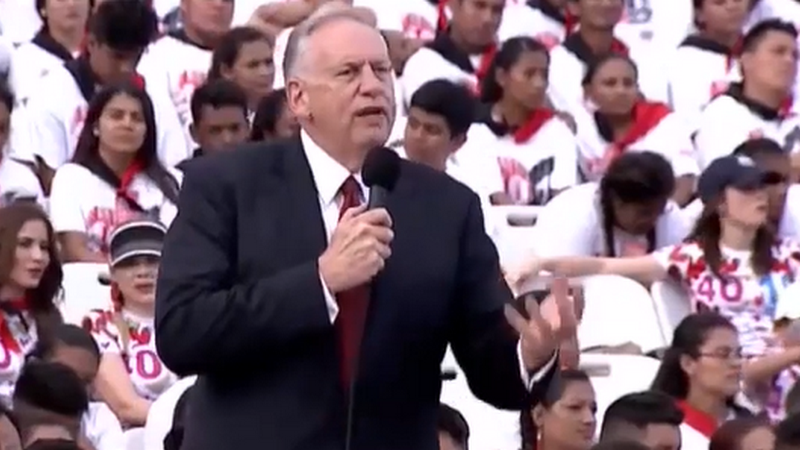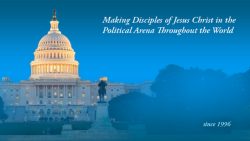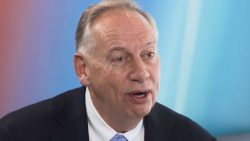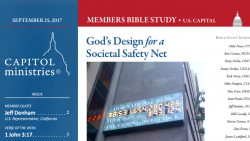Ralph Drollinger, whose ministry runs Bible studies for members of President Donald Trump’s cabinet and the U.S. Congress that are meant to “disciple” public officials to his particular “very conservative” interpretation of Christianity, traveled to Nicaragua this month at the invitation of President Daniel Ortega to discuss setting up similar Bible studies for Nicaraguan officials.
Drollinger spoke at a massive public gathering celebrating the 40th anniversary of the Sandinista revolution. Drollinger’s visit, and his gracious remarks for Ortega and his wife and Vice President Rosario Murillo, are striking in light of the intense criticism of the Ortega-Murillo regime by the U.S. government, which as recently as April expanded sanctions against individuals and institutions associated with the government–not to mention the disconnect between Ortega and Drollinger’s political backgrounds.
In an announcement of the most recent sanctions–against a bank and the son of the president and vice president—the U.S. undersecretary of the Treasury for Terrorism and Financial Intelligence said, “President Ortega, Vice President Murillo, and members of their inner circle continue to engage in blatant corruption, violence, and violations of basic human rights.” The government has also been criticized by international human rights advocates.
The latest U.S. sanctions came about one year after Nicaraguan officials and their allies killed hundreds of people and jailed or drove into exile thousands more in a violent crackdown on political protesters. Ortega, who has faced “persistent accusations” of election fraud, has consolidated his power, changed the constitution to eliminate term limits, and blocked opposition candidates from running for office. In August 2018, the Washington Post reported that “police and masked gunmen working with them have hunted down opposition leaders and protesters by the hundreds” and that many “have been killed, arrested, or disappeared.” In September, the BBC reported that the government had ordered the U.N. Commission on Human Rights to leave the country after it criticized the government’s use of excessive force against protesters and torture of detainees.
This April, the newspaper El País reported that repression under Ortega “has worsened during this year.” It cited a move by police to prevent regime opponents “from mobilizing in the streets of Managua.”
But there was no mention of any of that unpleasantness in Drollinger’s remarks at the July 19 celebration. He began his remarks by bringing greetings from the U.S. House of Representatives Bible study, the Senate Bible study, and “the U.S. White House cabinet member Bible study.”
Drollinger pronounced himself “blessed” and “honored” by the invitation to come to Nicaragua for the celebration and to talk about creating Bible studies for government officials. “In the United States of America, we have found amongst our political leaders, that it is essential they have a Bible teacher in their midst,” Drollinger said. He reiterated that point, saying “we have found in our nation, that it’s an important aspect of our government to have a Bible teacher in the midst of our political leaders.”
“Mrs. Vice President has said you are a Christian nation,” he told the crowd. “In America, we view ourselves as a Christian nation. But what is a Christian nation? A Christian nation is a Christian nation to the degree that the people in the nation reflect the attributes of God.”
Drollinger went on to say that it falls to the institution of the church to reflect the mercy, grace, love, patience and kindness of God, adding that other attributes include justice and righteousness, which God has “asked the state to manifest.”
We are personally to manifest the attributes of God’s justice and righteousness in our personal and our national life. And so to the degree that we reflect the love of Christ, to the degree that we reflect the mercy of Christ, to the degree that we reflect the grace of Christ, to the degree that we reflect the patience of Christ, to the degree that we reflect the justice of Christ, to the degree that our nation and our personal lives reflect the righteousness of Christ, is the degree to which we are or are not a Christian nation.
Let’s pause for a moment to remind ourselves what Drollinger and his Capitol Ministries teach about what God wants from public officials. Drollinger believes he has been called by God with a very specific purpose—to convert and “disciple” public officials at every level of government to his biblical worldview. Drollinger teaches public officials that the Bible endorses or mandates right-wing policy positions on economics, immigration, environmental regulation, abortion, LGBTQ equality, and the death penalty. Drollinger teaches that the government’s job is to “quell evil” and that governments and public officials “must send a constant message that sin will be punished.” He also teaches that the Bible promotes distinct gender roles, and he will not allow women to be Bible study leaders.
Drollinger’s teachings are reflected in his handbook for Christian public officials: Oaks in Office: Biblical Essays for Political Leaders. Capitol Ministries says that the Spanish-language edition is soon to be released and “will be used in the discipleship of the nation’s leaders.” Another Drollinger book, “Rebuilding America: The Biblical Blueprint,” has also been translated into Spanish and Portuguese with a new title, “Rebuilding a Nation.”
What might motivate Ortega and Murillo to invite Drollinger to Nicaragua and give him a speaking platform at a major national celebration? It’s a way to publicly wrap themselves in the mantle of Christianity, and perhaps poke a finger in the eye of the U.S. Treasury and State Departments by going over officials’ heads, so to speak, to an American who brags of his access at the highest levels of the U.S. government, including the White House.
This wouldn’t be the first time that Ortega and his wife have used religion for political purposes. A 2018 Washington Post article entitled “From Rebel to Strongman,” noted that when Ortega returned to office in 2006 a decade and a half after he was ousted by voters, he had “amped up his talk of peace and Christian values.” The BBC quoted Ortega saying in 2006, “Jesus Christ is my hero now.” According to Capitol Ministries, Ortega’s invitation said, “We know if the people that God has trusted with the destiny of a nation are born again, our legislators will legislate according to the Bible.”
By one estimate, Nicaragua is about one-half Catholic and one-third evangelical. While Ortega’s opposition to abortion has undoubtedly pleased church leaders from both groups, the government became increasingly hostile to the Catholic Church during the past year over some church leaders’ criticism of his abuses of power.
Foreign Policy reported last August, “In recent weeks, Nicaraguan President Daniel Ortega and forces loyal to him have targeted clergy, profaning and destroying Catholic churches, even killing those who seek refuge within them.” Foreign Policy noted that Vice President Mike Pence had slammed the Nicaraguan government for “virtually waging war on the Catholic Church and those calling for democracy and national dialogue.”
It’s worth noting that Drollinger has seemingly little tolerance for those whose take on Christianity or biblical interpretation differs from his own. He has called the Catholic Church “the world’s largest false religion.”
Given the hostility between the Nicaraguan government and the Catholic Church, the public embrace of Drollinger could be seen as a way for Ortega and Murillo to portray their government as publicly aligned with Christianity in spite of their feud with Catholic leaders.
Indeed, in April, shortly after presidential son Laureano Ortega Murillo was hit with sanctions by the U.S. government, he took part in an evangelical gathering where Managua Mayor Reyna Rueda was given the microphone to thank God for “the peace that reigns in our country.”
The appearance generated some side-eye reporting on the leaders’ newfound enthusiasms. “Until recently, it was normal to see the Ortega Murillo family attending mass,” noted La Presna. “But since the dictatorship declared the Catholic Church as an enemy, they have moved closer to certain evangelical leaders, whose position during the crisis that Nicaragua is going through has been silence.”
La Prensa quoted Eliseo Nunez, a former deputy and member of the Broad Front for Democracy (FAD) portraying the ruling family as unprincipled and willing to do anything to maintain their hold on power. He accused Ortega of “taking advantage of the opportunism of a few pastors” in order to falsely portray all evangelicals as his supporters. There were also some Catholic leaders present at the July 19 celebration, La Presna reported, including a priest who asked Drollinger to intercede with the U.S. government to lift its sanctions.
Capitol Ministries’ own reporting about Drollinger’s public appearance in Nicaragua, which includes a link to the video of his “sermon,” states, “Drollinger explained that in the Bible, God doesn’t talk about ‘Christian nations,’ that only individuals can become Christians by being forgiven for sin through the atoning work of Jesus Christ.” But that’s not accurate, according to the video of Drollinger’s remarks at the political rally. At no point does he “explain” that “God doesn’t talk about ‘Christian nations’”—nor does he talk on that video about “individuals becoming forgiven for sin through the atoning work of Jesus Christ.” [See update below for Capitol Ministries’ explanation.]
“A ‘Christian nation’ per se, doesn’t exist,” continues the Capitol Ministries blog post, “Nations can only be so-called ‘Christian’ to the extent that their laws and people are guided by Christian principles, two of which are righteousness and justice, Drollinger said.
Drollinger did not tell the crowd in Managua that a “Christian nation” doesn’t exist. As noted above, he did say that what makes a nation a Christian nation is that its people and leaders reflect what he calls the attributes of God. He prayed that the people, government officials and country of Nicaragua would reflect the attributes of God, and added, “May God cement these ideas as to what is a Christian nation.”
This apparent misrepresentation* of his public remarks, at least those captured on the video shared by Capitol Ministries itself, may reflect the group’s sensitivity to how researchers and reporters have characterized Drollinger’s positions on church-state separation—he says he supports institutional separation, but not influential separation—and on Christian nationalism, which he has denounced.
Drollinger’s public remarks were translated into Spanish by Oscar Zamora, Capitol Ministries’ Peru-based director for Latin America. Zamora reported that he recently met with Nicaraguan congressional leaders and with General Inspector Jaime Vanegas “who asked me to give a word to almost 200 police officers who were waiting for me at an auditorium next door.” He also said he had met with Managua Mayor Rueda.
After the trip, Capitol Ministries announced that Bible studies for Nicaragua’s cabinet and National Assembly deputies will be led by Arsenio Herrera, who reportedly pastors the largest evangelical church in Managua. Herrera, described as the “spiritual son” of the late American missionary David Spencer, has his own ambitious plans to have a church in every city in the country to go along with his TV ministries. “We are a national church,” he said in 2015. A few years ago he told the Daystar network that he is “believing for the transformation of the nation.” Daystar described him as “working to establish the Kingdom of God in Nicaragua.”
Capitol Ministries says it “has planted ministries in 24 foreign federal capitals and has an objective of establishing 200 ministries in 200 foreign nations in the years to come.” It says that since Zamora’s appointment as Latin America director, “ministries have been birthed in Honduras, Uruguay, Ecuador, Mexico, and Costa Rica.” And it has asked its supporters to pray “for upcoming launches in the federal capitals of Brasilia, Brazil on August 29, and Panama City, Panama on October 22.”
*Update: After this blog post was published, Capitol Ministries contacted Right Wing Watch to let us know that its story about Drollinger’s Nicaragua trip has been edited to clarify that the comments attributed to him that do not appear in the video were meant to be described as things he said later to “explain” the “intent” of his talk in Nicaragua. With this clarification, the CM post no longer appears to report inaccurately what he told the crowd; readers can judge for themselves how closely his actual remarks, which described what makes a nation a Christian nation, matched what Capitol Ministries says was his intent.








